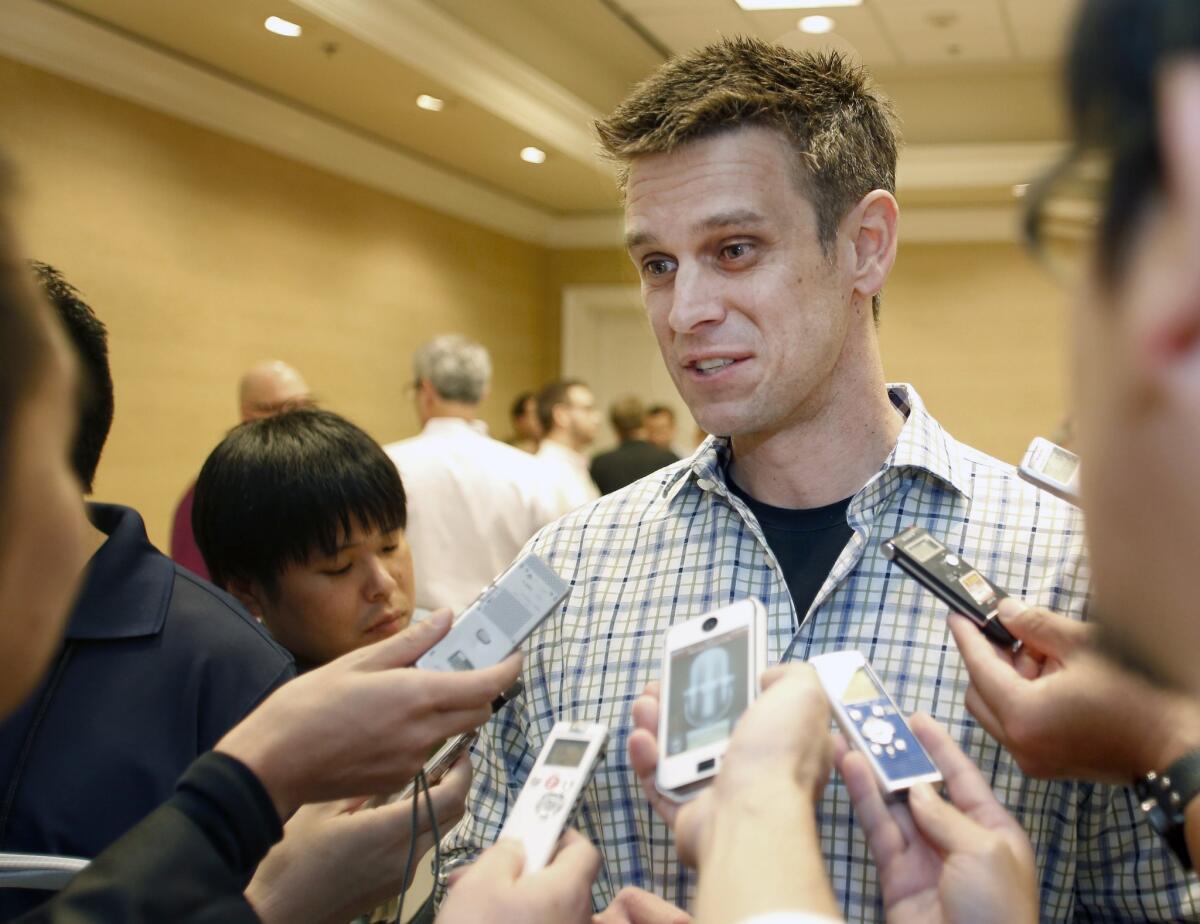Angels’ Jerry Dipoto is limited in attempt to improve team

- Share via
LAKE BUENA VISTA, Fla. — For a general manager heading into what could be his walk-the-plank year, Jerry Dipoto appears calm and assured. His contract guarantees him nothing beyond next season, and the playoffs have gone on without the Angels since 2009.
“You can’t operate out of fear,” Dipoto said.
Unfortunately for the Angels, they have two fail-safe mechanisms in place to guard against Dipoto making moves in the short-term interest of his job rather than the long-term interest of the club. Dipoto cannot sign a major free agent to a crazy deal or gut the farm system in a trade, because the Angels have very little money left to spend and no impact prospects to trade.
As the winter meetings open Monday, no one in the Angels’ front office expects a third consecutive Christmas surprise from ownership. Santa brought Albert Pujols to Anaheim two Decembers ago and Josh Hamilton last December, but to this point owner Arte Moreno has mandated his team remain under the luxury-tax limit.
After all, the limit goes no higher next year, when Mike Trout cashes in.
In 2014, the final season in which the Angels can pay Trout whatever they like, he figures to get between $500,000 and $600,000. He then becomes eligible for salary arbitration.
The highest salary awarded to a player through the arbitration process is $10 million. Trout could get $15 million in his first year of arbitration, $20 million his second year and $25 million his third and final year, according to a person familiar with the process.
The Angels have engaged in preliminary talks about a long-term extension with Trout, but they have no incentive to sign one any time soon, since that would trigger a luxury-tax payment this year. That buys the Angels a year to get the salaries of Joe Blanton and Vernon Wells off the books, which should cover Trout’s first arbitration contract and Hamilton’s $8-million raise in 2015.
The team-building part is trickier.
The Angels need starting pitching, desperately. They have addressed other needs first this winter — adding third baseman David Freese and relievers Joe Smith and Fernando Salas — while exploring free agency and trades with the tightest of budgets.
How tight? The Angels declined to offer Jerome Williams a contract because they could not risk a $700,000 hit to the budget. In today’s baseball world, that is essentially petty cash.
Williams is a valuable swingman, and he would have offered insurance and depth for a team currently without a fourth or fifth starter. He projected to make about $4 million in arbitration — Phil Hughes just got $24 million with similar statistics — and contracts awarded in arbitration are not guaranteed. So, if the Angels found better options between now and the end of spring training, they could have traded Williams or cut him and paid $700,000 in severance.
They could not afford the risk. They have about $15 million left to spend, and they need every penny.
They would like to sign one starting pitcher and trade for another, with the idea that acquiring a young and cheap pitcher would leave more money to sign a better free-agent pitcher. But, at a time Ricky Nolasco is getting $49 million and Jason Vargas $32 million, the kind of promising young arm the Angels want is exactly the kind of cost-effective arm teams want to keep.
The Angels and Dodgers had agreed on the outline of a trade last summer, with second baseman Howie Kendrick to the Dodgers for pitching prospect Zach Lee. However, the deal fell apart over what other prospects the Angels might be able to get, and the Dodgers since have signed Cuban product Alexander Guerrero to play second base.
The Angels offered Kendrick to the Detroit Tigers, but the Tigers needed payroll relief. The New York Yankees need a second baseman, but they have no excess pitching to trade. The Kansas City Royals could use a second baseman; they have said no to Kendrick, but the Angels might ask again, to see whether the Royals want a bat now that Carlos Beltran said no to Kansas City and yes to the Yankees.
The Chicago White Sox need offense and have pitching, but the Angels were denied on Hector Santiago. The Arizona Diamondbacks could be a fit for Mark Trumbo, but the Angels probably would not consider pitcher Tyler Skaggs — a onetime Angels first-round draft choice — enough of a return.
The best pitcher available in trade should be David Price of the Tampa Bay Rays, but the Angels are not even pretending they have the prospects to get him. If Japanese ace Masahiro Tanaka becomes available, as expected, the Angels expect to offer the refundable $20 million to talk to him, but they fully expect to be outbid by the Yankees and Dodgers.
They do not want to surrender the draft pick necessary to sign Ervin Santana or Ubaldo Jimenez, but they do not have the money, either. They could sign Matt Garza, if his price drops and he wants to pitch close to home. They have no interest in Bartolo Colon and some in Bronson Arroyo, although each might be out of their price range.
That leaves the Angels looking at the likes of Mike Pelfrey, Chris Capuano, Jason Hammel, Paul Maholm and Edinson Volquez. Sign two and try to outslug everyone else?
“As an offensive team, we’re in very good shape,” Dipoto said. “In the bullpen, we’re in good shape. In the starting rotation, there’s still work to be done.”
And, perhaps, one last winter to try to do it.
Twitter: @BillShaikin
More to Read
Go beyond the scoreboard
Get the latest on L.A.'s teams in the daily Sports Report newsletter.
You may occasionally receive promotional content from the Los Angeles Times.











